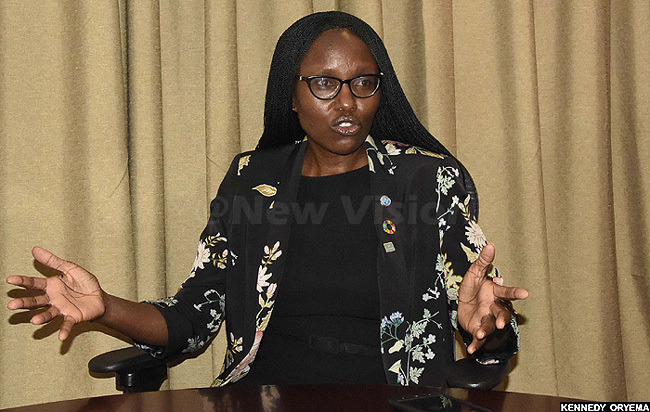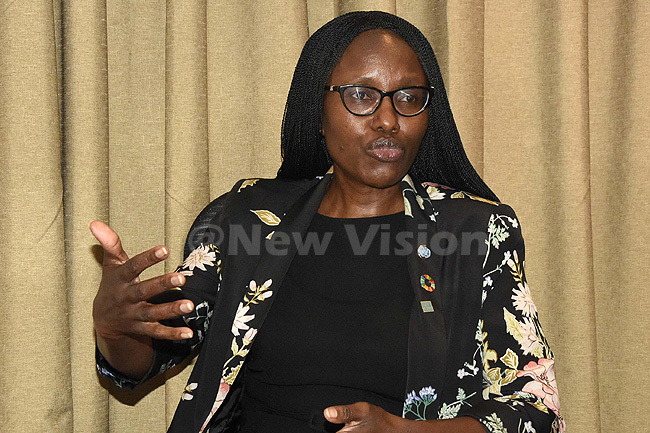What the PPP conference is all about
Sep 17, 2019
Many countries have responded to PPPs by establishing what we call an enabling environment, policies, regulatory and institutional framework.

PUBLIC PRIVATE PARTNERSHIPS CONFERENCE
Uganda is hosting the first high-level inaugural Public Private Partnerships (PPPs) conference, with focus on infrastructural development. The first of its kind in Africa, the conference that is under way in Kampala (16-18) is providing a platform for African governments to pitch country projects and private sector players will have an opportunity to identify critical infrastructure projects for investment. To understand the conference, and what Uganda stands to benefit from this African international gathering, New Vision's Henry Sekanjako had a chat with Beatrice Florah Ikilai, the chief organizer and the vice chair of United Nations Economic Commission for Europe Bureau of working Party on Public Private Partnerships, about the conference.
 Beatrice Florah Ikilai
Beatrice Florah Ikilai
______________________________
What are Public Private Partnerships?
These are infrastructure engagements where Government partners with the private sector to deliver infrastructure services. Ordinarily, these are infrastructure services which Government is supposed to implement, but because of challenges such as the budget, technology, innovations and capacities, so Government partners with the private sector to deliver these infrastructure services considering that they have expertise and financial muscle.
Secondly, PPPs are commercial transactions which are normally between 10, 15, 20 or 30-plus years, where Government contracts the private party to deliver infrastructure services on behalf of government for a specified period of time but it involves risk allocations so risk is transferred to the party which is able to manage the risk.
What are some of the sectors that these PPPs fall?
PPPs fall in all sectors, but mainly in energy, oil and gas, works and transport, health, education agriculture, housing and local government . It also involves some service contracts when you want to operate and maintain an accommodation project. When you want to improve and maintain a road, you can use Public Private Partnerships.
Uganda is hosting the PPPs conference, which is the first of its kind in the country and Africa. Why was Uganda selected in the whole of Africa?
This conference would have been held anywhere in Africa - Egypt, Nigeria, South Africa and Morocco. These countries wanted to host this conference, but being the first African and Ugandan at the United Nations Economic Commission for Europe Bureau of working Party on Public Private Partnerships, I said 'let me bring this conference home' because I wanted Ugandans to get a feel of an international PPPs conference because the conference is for Ugandans to benefit.
How are Ugandans going to benefit from this conference?
Training.
Meeting these high-profile PPPs experts whom I have met always when I go out in those countries. So this time I said 'You come to my country so that you can bring that experience home so that my country can get to know how these PPPs are done what the dos and don'ts are. So this conference is for Ugandans and Africa.
I encourage Ugandans to take part in this conference because the next one is happening in Nigeria and by the time it comes back to Uganda, it will be after 55 or 56 years. We want every African country to host the conference.
 The Kiira EV SMACK car is on show at the PPPs conference
The Kiira EV SMACK car is on show at the PPPs conference
Besides the training and sharing knowledge, are there any other opportunities that Ugandans are likely to benefit from this conference?
Do not underestimate training. PPPs are very complex, so if you do not understand the game, you cannot play the game. You need to come and build your capacity in PPPs , the lawyers, the finance people, construction firms, the tax people and even the media - you need to know what you are reporting on. You cannot do PPPs in one day, so day one will give you a flavour of what PPPs is all about. Discussions on day one will help you to understand what the conference is about.
The conference brings lots of opportunities for Uganda; it will provide a chance for Uganda to pitch PPPs projects that they have. The opportunity to exhibit what people have so that it is known for stronger partnerships.
The conference also provides sessions - these are be in the side rooms, whereby the private sector identifies a country of its choice like Uganda. They might want projects in energy, works and transport, tourism, so they might say 'I want to speak to Uganda', so they will be able to find the different countries that they want to partner with and get the deals they want and the partnerships start.
How would you advise someone who wants to join the PPPs space?
Awareness.
When you hear about a PPPs conference like the one happening in Uganda, get interested. For example, I do not know how many Ugandans know that the Kampala-Jinja Expressway is going to be a PPPs project. What role can you play as either a journalist, accountant, lawyer, construction firm?
What is your role in the PPPs? You need to get interested in the PPPs space and if you find that you do not have the skills, go out there and look for the skills that will fit into the space otherwise you will find international players coming to take up the jobs you would have actually taken because you are not positioned to take them up.
PPPs have been around for some time. How have African countries responded to these PPPs especially Uganda?
Many countries have responded to PPPs by establishing what we call an enabling environment, policies, regulatory and institutional framework. For Uganda, we have a policy in place, it was approved in 2010 and then you have a law in place which was approved by the President in 2015. We have an institutional framework, for example, the PPPs UniT under the finance ministry, the PPPs committee, which is the oversight body that approves the PPPs projects, laws guidelines and also oversees and monitors the PPPs projects. You have offices like the solicitor general's office. The law provides that all PPPs projects must be cleared by the solicitor general's office as a legal adviser to the government. Every institution has a PPPs department responsible for identifying PPPs projects in each institution for delivery.

Looking at Uganda, do we have any success stories as a result of the PPPs arrangement?
The law was passed in 2015, so based on the law, we do not have a project that has been signed off under the law. But before the law came into place, there are PPPs projects that we have done, under the Privatization Act.
The Kampala Serena Hotel, formerly Nile Hotel, is a PPPs product, where Government concessioned out the assets of Nile Hotel then to the private sector for it to redevelop, expand and improve the services of the hotel to a five-star hotel. There is a revenue sharing agreement where some revenue is given to government.
The other one is UMEME which arose from the unbinding of the electricity sector. We also have Bujagali Hydro Power plant that was done before the law came into force and immediately after the law came into place.
What are some of the challenges you have come across under the PPPs?
PPPs have a lot of challenges; one of them is capacity. There is a misconception about what PPPs is about. If I engage any private sector, people think that is PPPs and yet PPPs have a specific procedure you have to follow. For example, you have to conceive a project, there must a benefit cost analysis, there must be revenue justification for the PPPs, and there must be a detailed feasibility study, solutions options and analysis. If you are happy as Government, then you can interest the private sector to partner for the project.
The other bit is that we do not have the capacity to do project preparations. So we need to build capacities to do feasibility studies, to do design of these projects such as the road projects. You must have engineers who must know how to design these projects. Before you can interest the private parties, you need people who can negotiate.
Who is attending the conference?
We are expecting President Yoweri Museveni, who will be the guest of honour, to officially open the conference, Elly Karuhanga a renowned expert in law and infrastructure, CEO of Kiir Motors, CEO UNRA, Minister of energy, minister of works and transport. Internationally, we have the Africa Union head for infrastructure development, global infrastructure hub, United Nations economic commission for Africa, responsible for infrastructure development but most importantly, the African Development Bank. We shall also have experts from different countries such as Malawi, Ghana, Kenya, and Tanzania they will all be coming.
Where do you see the future of PPPs in the next 10 or 20 years from now?
I see it as growing further because the government budgets are limited - the budgets can only fund a little bit of the infrastructure , so it is important that we leverage the private sector expertise financing for us to deliver infrastructure projects . If you go to Canada, Australia or even South Africa, the kind of infrastructure that they have is not that government that gave it - it is the private sector. They partnered with the private sector to have some of that infrastructure arrangement. If we follow the right path and do the right things, we shall see our infrastructure developed to that level. We shall achieve the middle income status because many people will have the jobs and infrastructure. Trade will be easy because with PPPs, we are able to do cross-border infrastructure, and you can have a road running from Uganda to South Africa without us boarding a plane.
Many Ugandans in the private sector would want to partner with Government on various projects, but they are hindered by the lack of resources. How else can they come on board under the PPPs arrangement?
It starts with the mindset.
The mindset of Ugandans should change because when they hear about Public Private Partnerships, they look at the big funds. When they hear about PPPs, they look at big things. They can position themselves wherever they are to benefit from PPPs. When they hear about PPPs, they should run and see how they can participate because PPPs is not only for the big guys who have big money, but also you with your small money can be sub-contracted to do something within the PPPs. For example, when doing the Jinja-Kampala Expressway, the big guys are going to come with big mone, but there are other small things like cleaning the road , drainages and women cooking the food. Do not look at PPPs as only for the big guys.
What is required of someone who wants to attend the PPPs conference?
The conference is a paid conference because we have to fly the speakers. We have to meet conference expenses so the conference fee for Ugandans is $400 and this will take care of the training, certificates, access to all amenities that will be available at the conferences. That $400 (about sh1.5m) is a discount for Ugandans to make sure they come and attend the conference. The international delegates are required to pay $750 (sh2.8m).
